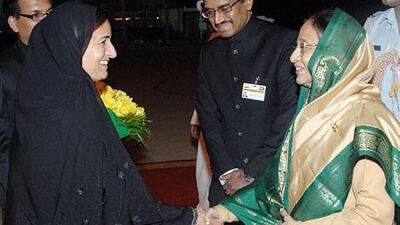ABU DHABI // The Indian President Pratibha Patil arrived on Sunday night to begin her official four-day state visit of the country.
President Patil, the country's 12th elected leader and the first woman to hold the position, officially kicks off her first visit to the Gulf by meeting Sheikh Khalifa, President of the UAE, on Monday.
The trip is aimed at boosting trade ties between the two countries, according to members of the Indian business community.
India is the UAE's largest trading partner, with imports and exports worth US$43 billion (Dh157bn) in 2009-10, according to the Indian government.
The last president, APJ Abdul Kalam, visited the UAE in 2003. Indian residents and business owners in this country say this year's trip has tremendous significance.
"From curry leaves to the largest electrical turbine, we trade in everything," said Mr KV Shamsudheen, who has lived in the Emirates since 1970 and is the founder of the Pravasi Bandhu Welfare Trust, an organisation that advises expatriate Indians, especially low-income workers, on how to handle savings and avoid debt.
Soon after the late Indian prime minister, Indira Gandhi, visited in 1981, there were changes in the Indian banking sector to better accommodate the demands of expatriate Indians, he said. By 1983, Mrs Gandhi had successfully increased the interest rate for non-resident Indian bank deposits.
After Mr Kalam's visit in 2003, education in the two countries took a step forward as universities in the UAE affiliated to those in India opened their doors.
"There have been major benefits after each visit," Mr Shamsudheen said.
During her visit, Mrs Patil will also meet with Indian expatriates.
Her schedule includes the inauguration of the Abu Dhabi Indian Islamic Centre. MA Yussuf Ali, the managing director of Emke Group, which owns the Lulu chain of supermarkets, was tasked with building the centre on land donated by Sheikh Zayed. The foundation stone was laid by Mrs Gandhi in 1981.
"It is such a pleasant coincidence that the foundation stone of this Indian Islamic Centre was laid by the first woman prime minister of India, and now it is going to be inaugurated by the first woman president of India," said Mr Yussuf Ali. "The fact that this centre is built on a plot given by the late Sheikh Zayed goes on to show the love and respect the UAE has for Indians."
He recalled vividly his meeting with Mrs Gandhi.
"That visit gave us Indians here an immense sense of pride and her views on Indo-UAE ties was very well received by the rulers of this great country," he said.
B R Shetty, the chief executive of the NMC group of companies, which includes pharmaceuticals, financial services and hospitality, was present during a meeting between Mrs Gandhi and Sheikh Zayed in 1981.
"The bilateral relationship has built up since then," Mr Shetty said. "She was an international figure and we felt honoured to meet her."
Mr Kalam's visit seven years ago was also memorable to some of the students he talked to about the importance of education. Mr Kalam was a nuclear scientist before he was elected president.
Posing a question to a leading nuclear scientist who pioneered India's missile programme made Ritesh Matlani, then a 14-year-old student of Dubai Modern High School, a bit anxious. He was among 1,800 students packed into the Sheikh Rashid auditorium for an hour-long meeting with Mr Kalam.
"It was overwhelming. It got me nervous," said Mr Matlani, now a 21-year-old media student at Dubai's Manipal University. "When you ask a question of a country's highest representative it's a different feeling. But he has a very soothing voice and that calmed me down."
Mr Matlani's question focussed on how India could stem the flow of people leaving the country for better opportunities abroad.
"He came across as humble, very genuine and willing to answer all our questions," Mr Matlani said. "He spoke about how the youth must have faith in the country that had given us our identity."
sbhattacharya@thenational.ae
rtalwar@thenational.ae

Indian president arrives on first state visit to UAE
Pratibha Patil arrived on Sunday night to begin her official four-day state visit of the country, welcomed by business leaders.
Most popular today

